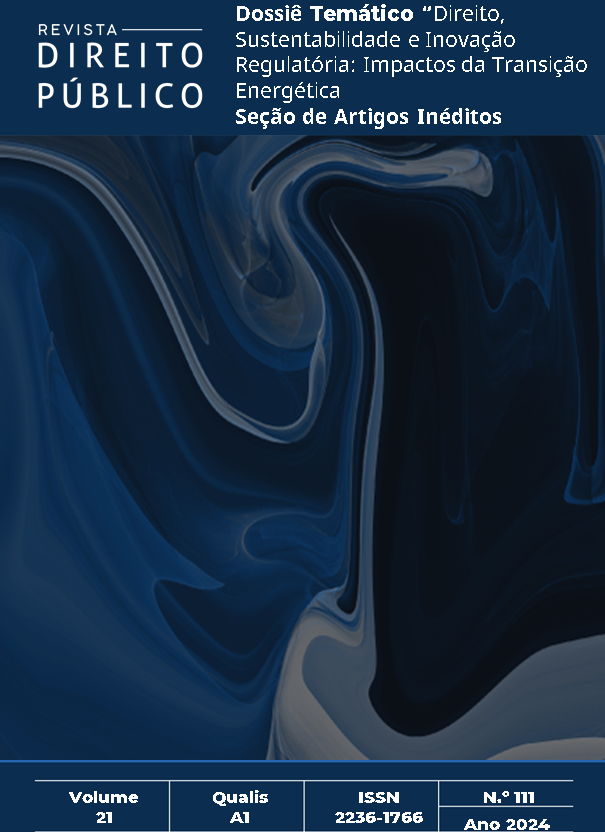Justiça Distributiva em Conflitos de Energia Eólica: Análise de Decisões Judiciais sobre Impactos de Parques no Ceará
DOI:
https://doi.org/10.11117/rdp.v21i111.7940Abstract
Conflicts in wind energy projects highlight the dynamics of land use and appropriation, balancing, on one hand, social relations and material and symbolic ties, and on the other, commodification for industrial purposes. In Ceará, the sustainable energy transition agenda, focused on renewable sources, has been strongly promoted. However, transition policies that disregard local realities can create inconsistencies in promoting the right to an ecologically balanced environment for affected populations and fail to ensure the right to energy broadly and accessibly. This study analyzes the positive and negative impacts of wind farms in 81 judicial processes from the Ceará Court of Justice (TJCE) over the past 20 years, identifying the affected actors. The results indicate that power relations and institutional choices asymmetrically distribute the burdens and benefits of wind farms in the state, providing minimal and unpredictable benefits to local communities. Consequently, distributive justice is not fully realized by the judiciary, which, often restrained by the principle of "public utility," limits itself to compensating for damages already suffered without effectively redistributing positive and negative impacts. Additionally, the scarcity of collective demands prevents the consideration of broader environmental, cultural, and socioeconomic damages, contributing to the maintenance of deprivations among affected social groups.
Downloads
References
BANERJEE, Aparajita; SCHUITEMA, Geertje. How just are just transition plans? Perceptions of decarbonisation and low-carbon energy transitions among peat workers in Ireland. Energy Research & Social Science, v. 88, p. 102616, 2022. Disponível em: https://www.sciencedirect.com/science/article/pii/S2214629622001207. Acesso em: 03 dez. 2022. DOI: https://doi.org/10.1016/j.erss.2022.102616
BATEL, Susana. Research on the social acceptance of renewable energy technologies: Past, present and future. Energy Research & Social Science, v. 68, p. 101544, 2020. DOI: https://doi.org/10.1016/j.erss.2020.101544
BRANNSTROM, Christian et al. Is Brazilian wind power development sustainable? Insights from a review of conflicts in Ceará state. Renewable and Sustainable Energy Reviews, v. 67, p. 62-71, 2017. Disponível em: https://www.sciencedirect.com/science/article/abs/pii/S1364032116304804. Acesso em: 15 jul. 2024. DOI: https://doi.org/10.1016/j.rser.2016.08.047
BRANNSTROM, Christian et al. What explains the community acceptance of wind energy? Exploring benefits, consultation, and livelihoods in coastal Brazil. Energy Research & Social Science, v. 83, p. 102344, 2022. DOI: https://doi.org/10.1016/j.erss.2021.102344
BRASIL. Decreto-lei nº 3.365, de 21 de junho de 1941. Dispõe sobre desapropriações por utilidade pública. Brasília, 1941. Disponível em: https://www.planalto.gov.br/ccivil_03/decreto-lei/del3365.htm. Acesso em: 05 dez. 2022.
BRASIL. Lei n. 10.406, 10 de janeiro de 2002. Institui o Código Civil. Diário Oficial da União, Brasília, DF, 11 jan. 2002. Disponível em: https://www.planalto.gov.br/ccivil_03/leis/2002/l10406compilada.htm. Acesso em: 05 dez. 2022.
BRASIL. Lei n. 12.651, de 25 de maio de 2012. Dispõe sobre a proteção da vegetação nativa (...). 2012. Diário Oficial da União, Brasília, DF, Ano CXLIX, n. 102, 28 maio 2012. Seção 1, p.1. Disponível em: https://www.planalto.gov.br/ccivil_03/_ato2011-2014/2012/lei/l12651.htm. Acesso em: 05 dez. 2022.
BRASIL. Lei n. 8.987, de 13 de fevereiro de 1995. Dispõe sobre o regime de concessão e permissão da prestação de serviços públicos previsto no art. 175 da Constituição Federal. Diário Oficial da União, Brasília, DF, 14 fev. 1995. Disponível em: https://www.planalto.gov.br/ccivil_03/leis/l8987cons.htm. Acesso em: 15 jul. 2024.
BROWN, Keith Brower. Wind power in northeastern Brazil: Local burdens, regional benefits and growing opposition. Climate and Development, v. 3, n. 4, p. 344-360, 2011. DOI: https://doi.org/10.1080/17565529.2011.628120
CASIMIRO, X. X. I. V.; MELO, Lígia Maria Silva; CARVALHO, Harley. Para cidades justas, em rede e inteligentes: uma agenda pública pelo direito à cidade sustentável. International Journal of Digital Law, Belo Horizonte, v. 2, n. 1, p. 199-215, 2021. DOI: https://doi.org/10.47975/IJDL/1casimiro
COWELL, Richard; BRISTOW, Gill; MUNDAY, Max. Acceptance, acceptability and environmental justice: the role of community benefits in wind energy development. Journal of Environmental Planning and Management, v. 54, n. 4, p. 539-557, 2011. DOI: https://doi.org/10.1080/09640568.2010.521047
ELLIS, Geraint; FERRARO, Gianluca. The social acceptance of wind energy: Where we stand and the path ahead. In: International Energy Agency-Task 28 Social Acceptance of Wind Energy Workshop. 2017.
ELMALLAH, Salma; RAND, Joseph. “After the leases are signed, it's a done deal”: Exploring procedural injustices for utility-scale wind energy planning in the United States. Energy Research & Social Science, v. 89, p. 102549, 2022. DOI: https://doi.org/10.1016/j.erss.2022.102549
FRASER, Nancy et al. Social justice in the age of identity politics: Redistribution, recognition, and participation. Culture and economy after the cultural turn, v. 1, p. 25-52, 1999. DOI: https://doi.org/10.4135/9781446218112.n2
FREITAS, Roberto; LIMA, Thalita Moraes. Metodologia de análise de decisões. Universitas Jus, v. 2, 2010. Disponível em: https://www.uhumanas.uniceub.br/jus/article/view/1206. Acesso em: 13 jun. 2024.
GOODIN, Robert E. Green political theory. John Wiley & Sons, 2013.
GORAYEB, Adryane; BRANNSTROM, Christian. Caminhos para uma gestão participativa dos recursos energéticos de matriz renovável (parques eólicos) no nordeste do Brasil. Mercator (Fortaleza), v. 15, p. 101-115, 2016. DOI: https://doi.org/10.4215/RM2016.1501.0008
GORAYEB, Adryane; BRANNSTROM, Christian. Licenciamento Ambiental e Oposição Social à Energia Eólica: estudo de caso com foco no social gap em comunidade litorânea do Ceará, Brasil'. Magazine of Geography (Recife), v. 37, n. 3, 2020. DOI: https://doi.org/10.51359/2238-6211.2020.244346
GORAYEB, Adryane et al. Wind-energy development causes social impacts in Coastal Ceará state, Brazil: the case of the Xavier Community. Journal of Coastal Research, n. 75 (10075), p. 383-387, 2016. DOI: https://doi.org/10.2112/SI75-077.1
HAZRATI, M.; HEFFRON, R. J. Conceptualising restorative justice in the energy transition: Changing the perspectives of fossil fuels. Energy Research & Social Science, v. 78, p.102-115, 2021. DOI: https://doi.org/10.1016/j.erss.2021.102115
HEFFRON, Raphael J.; MCCAULEY, Darren. The concept of energy justice across the disciplines. Energy Policy, v. 105, p. 658-667, 2017. DOI: https://doi.org/10.1016/j.enpol.2017.03.018
HOCHSTETLER, Kathryn. Political economies of energy transition: wind and solar power in Brazil and South Africa. Cambridge University Press, 2020. DOI: https://doi.org/10.1017/9781108920353
LAI, Huei-Ling. Foregrounding the community: Geo-historical entanglements of community energy, environmental justice, and place in Taihsi Village, Taiwan. Environment and Planning E: Nature and Space, v. 5, n. 2, p. 666-693, 2022. Disponível em: https://journals.sagepub.com/doi/pdf/10.1177/25148486211000745. Acesso em: 06 nov. DOI: https://doi.org/10.1177/25148486211000745
LLOVERAS, Javier et al. Mobilising sense of place for degrowth? Lessons from Lancashire's anti-fracking activism. Ecological Economics, v. 183, p. 106754, 2021. DOI: https://doi.org/10.1016/j.ecolecon.2020.106754
MEIRELES, A. J. A. Danos socioambientais originados pelas usinas eólicas nos campos de dunas do nordeste brasileiro e critérios para definição de alternativas locacionais. Confins, v. 11, p. 1-20. 2011 DOI: https://doi.org/10.4000/confins.6970
MAIA, Fernando Joaquim Ferreira; BASSO, Ana Paula; SOUZA, Karolina Maria Fonseca de. A necessidade da regularização fundiária prévia em áreas de potencial eólico como mecanismo de proteção dos posseiros ante o processo de expansão energética: o caso de Santa Luzia, Paraíba, Brasil. Geografares, n. 38, 2024. Disponível em: https://journals.openedition.org/geografares/12857. Acesso em: 14 jul. 2024. DOI: https://doi.org/10.47456/geo.v4i38.44771
MEIRELES, A. J. et al. Impactos socioambientais da energia eólica no litoral cearense. Correia, LJA; Oliveira, VPV; Maia, JA. Evolução das paisagens e ordenamento territorial de ambientes interioranos e litorâneos. Fortaleza: Expressão Gráfica, p. 156-169, 2015.
MOVIMENTO ECONÔMICO. Ceará firma parceria com Banco Mundial para avançar com hidrogênio verde. 13 de maio de 2022. Disponível em: https://movimentoeconomico.com.br/estados/2022/05/13/ceara-firma-parceria-com-banco- mundial-para-avancar-com-hidrogenio-verde/. Acesso em 19 jul. 2022.
O'NEILL, John; SAGOFF, Mark. Ecology, policy and politics. Trends in Ecology and Evolution, v. 9, n. 12, p. 498, 1994. DOI: https://doi.org/10.1016/0169-5347(94)90328-X
PLATAFORMA CEARÁ 2050. Atividade 3. Elaboração da Visão de Futuro e Objetivos Estratégicos. Novembro de 2018. Disponível em: http://www.ceara2050.ce.gov.br/api/wp- content/uploads/2019/01/ceara-2050-produto-3-3-visao_objetivos_indicadores_metas_24- 11.pdf. Acesso em 19 jul. 2022.
PINTO, D. G.; MONZONI NETO, M. P.; ANG, H. G. Grandes obras na Amazônia: aprendizados e diretrizes [recurso eletrônico] / organizadores: Daniela Gomes Pinto, Mario Prestes Monzoni Neto, Hector Gomez Ang. – 2.ed. – São Paulo: FGV-EAESP/FGVces, 302 p. 2018.
RIBEIRO, Cláudio. Tremembés temem perder acesso e rejeitam eólicas no mar. Jornal O Povo. 25 de maio de 2022. Disponível em: https://mais.opovo.com.br/jornal/reportagem/2022/05/25/tremembes-temem-perder-acesso-e- rejeitam-eolicas-no-mar.html. Acesso em 25 jul. 2022.
RIBEIRO, Gilmar Lopes. Parques eólicos-Impactos socioambientais provocados na região da praia do Cumbe, no município de Aracati Ceará. 2013. 2013. Tese de Doutorado. Tese. (Doutorado em Geografia)–Instituto de Geociências e Ciências Exatas, Universidade Estadual Paulista, Rio Claro-SP.
SIMCOCK, Neil; FRANKOWSKI, Jan; BOUZAROVSKI, Stefan. Rendered invisible: institutional misrecognition and the reproduction of energy poverty. Geoforum, v. 124, p. 1-9, 2021. Disponível em: https://www.sciencedirect.com/science/article/pii/S0016718521001421. Acesso em: 14 jul. 2024. DOI: https://doi.org/10.1016/j.geoforum.2021.05.005
SOARES, Ítalo Nogueira; GAVA, Rodrigo; DE OLIVEIRA, José Antônio Puppim. Political strategies in energy transitions: Exploring power dynamics, repertories of interest groups and wind energy pathways in Brazil. Energy Research & Social Science, v. 76, p. 102076, 2021. DOI: https://doi.org/10.1016/j.erss.2021.102076
SOVACOOL, Benjamin K. et al. Conflicted transitions: Exploring the actors, tactics, and outcomes of social opposition against energy infrastructure. Global environmental change, v. 73, p. 102473, 2022. Disponível em: https://www.sciencedirect.com/science/article/pii/S0959378022000115. Acesso em: 1 set. DOI: https://doi.org/10.1016/j.gloenvcha.2022.102473
SOVACOOL, Benjamin K. et al. Energy decisions reframed as justice and ethical concerns.
Nature Energy, v. 1, n. 5, p. 1-6, 2016. Disponível em:
https://www.nature.com/articles/nenergy201624. Acesso em: 03 dez. 2022.
SOVACOOL, Benjamin K.; DWORKIN, Michael H. Global energy justice. Cambridge University Press, 2014. Disponível em: https://books.google.com.br/books?hl=pt- BR&lr=&id=G_hkBAAAQBAJ&oi=fnd&pg=PR13&dq=B.+Sovacool,+M.+Dworkin,+Glob al+Energy+Justice,+Cambridge+University+Press,+Cambridge,+UK,+2014.+&ots=MtLnEjD rnh&sig=9pAi6g3zMVzMzGRcGSLzC81IC4U. Acesso em: 03 dez. 2022.
SOVACOOL, Benjamin K. What are we doing here? Analyzing fifteen years of energy scholarship and proposing a social science research agenda. Energy Research & Social Science, v. 1, p. 1-29, 2014. Disponível em: https://www.sciencedirect.com/science/article/abs/pii/S2214629614000073. Acesso em: 03 dez. 2022. DOI: https://doi.org/10.1016/j.erss.2014.02.003
TRALDI, M. Acumulação por despossessão: a privatização dos ventos para a produção de energia eólica no semiárido brasileiro. 2019. Tese (Doutorado em Geografia) – Instituto de Geociências. Universidade Estadual de Campinas, Campinas, 2019.
VAN DER HORST, Dan. NIMBY or not? Exploring the relevance of location and the politics of voiced opinions in renewable energy siting controversies. Energy policy, v. 35, n. 5, p. 2705-2714, 2007. DOI: https://doi.org/10.1016/j.enpol.2006.12.012
WOLSINK, Maarten; DEVILEE, Jeroen. The motives for accepting or rejecting waste infrastructure facilities. Shifting the focus from the planners' perspective to fairness and community commitment. Journal of environmental planning and management, v. 52, n. 2, p. 217-236, 2009. DOI: https://doi.org/10.1080/09640560802666552
Published
How to Cite
Issue
Section
License
Copyright (c) 2024 Direito Público

This work is licensed under a Creative Commons Attribution-NonCommercial 4.0 International License.
O(s)/A(s) autores(as) dos manuscritos submetidos concorda(m) com as regras a seguir:
1) Todos os autores e autoras participaram do trabalho, são responsáveis pelas ideias e conceitos nele emitidos e atestam sua conformidade com os princípios éticos exigidos.
2) Todos os autores e autoras concordam com a forma final do trabalho e em ceder os direitos para publicação nos canais de publicação da Escola de Direito do IDP.
3) Todos os autores e autoras informam que o manuscrito é de sua autoria e assumem a responsabilidade pelo trabalho, declarando que a obra a ser publicada não infringe quaisquer direitos de propriedade intelectual de terceiros.
3.1) Em caso de submissão simultânea, além da reprovação imediata do artigo e comunicação ao(s) respectivo(s) periódico(s), a Revista Direito Público se reserva o direito de não receber novas submissões de todos os autores implicados pelo prazo de 2 (dois) anos, contado a partir da data de ciência do fato.
4) Todos os autores e autoras autoriza(m) a edição de seu trabalho e cede(m) à Escola de Direito do IDP os direitos de autor para reproduzir, editar e publicar ou veicular o citado trabalho em qualquer forma midiática, resguardada a autoria, em particular sob forma digital, em arquivo eletrônico online na Internet, bem como armazená-los em seu repositório de acordo com o desenvolvimento do processo editorial. Esta concessão não terá caráter oneroso para a Escola de Direito do IDP, não havendo remuneração sob qualquer modalidade pela utilização do referido material, tendo este o caráter de colaboração científica.












